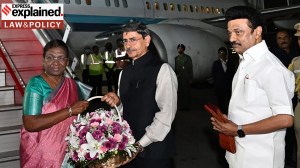Four more years for Services Inc
Luckily for India, George Bush, who openly supports outsourcing — on which a booming services trade hinges — is back in power. A s...

Luckily for India, George Bush, who openly supports outsourcing — on which a booming services trade hinges — is back in power. A smart India Inc, which exported services worth $20.3 billion in 2002, should be working on a wish list for its biggest trading partner.
The likely contents: A quicker H1 visa regime, flexible inter-corporate transfers of employees, mergers, perhaps acquisitions and certainly, joint ventures of US and Indian service providers in professional services, telecom and energy.
‘‘There’s more to services than IT and software, though that has been the mainstay in services so far,’’ said an analyst. ‘‘Transportation, construction, financial, insurance and environmental services are untapped,’’ he adds.
THE ROADMAP
RBI showed the latent opportunity last year: Only two of the 10-odd services India exports had positive balance of payments by 2002: Software and travel. In all others including financial, management, transportation and construction services, the trade balance was negative, with financial services leading the deficit. ‘‘In some services, we unilaterally need access to US markets — such as professional services. In others, the exchange is two-way, like for outsourcing. India would do well to chalk out a long-term plan for sectors it wants to target for greater services exchange,’’ says economist with the Indian Council for Research on International Economic Relations, Arpita Mukherjee.
Many economists and global trade analysts feel Bush cannot restrict where his companies do business – even the 31 proposed bans on BPO dealt only with government procurement, a minuscule proportion of overall offshoring. The real loophole in trade, is the absence of common rules to govern service trade globally. This leaves Bush relatively free to hold back — or offer — access.
THE NEGOTIATIONS
Among the six ‘Singapore issues’ that the multilateral trading system has failed to agree on are cross-border people movement and government procurement. These crucial elements are left for nations to resolve bilaterally. On another front, for recognising professional degrees, mutual recognition agreements (MRA) have to be worked out. ‘‘In bilateral FTAs with America outside the scope of WTO, Indian businesses can seek or offer exemptions. So if US offers Singapore and Chile H1 B1 visas with larger quotas and flexibility, this is the sort of exemption India can seek for sectors like audio-visual and retail, where interests don’t necessarily collide over job insecurity or taxes,’’ says an analyst.
India Inc screams from rooftops over procedural simplifications and non-tariff barriers that hamper people movement or services delivery. But several issues lie within. For instance, China entered a MRA for recognition of its engineers with the US this year. India, which does not register its engineers as professionals, cannot be part of the Washington Accord.
‘‘A closer look shows that India needs to set standards for professionals, open access to areas like legal consulting or chartered accountancy and set up bodies that can correspond with America’s system,’’ says Mukherjee.
From an American point of view, the Bush regime will push for economic clarity and reforms in sectors like insurance, financial services and retail. Any way you look at it, America has been an open market for long enough to want to set the terms. It doesn’t matter if Bush wins or Kerry.
Photos


- 01
- 02
- 03
- 04
- 05





























